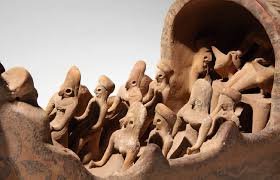Excavation Unearths 5,200-Year-Old Harappan Settlement in Kachchh, Gujarat
Introduction to the Harappan Settlement Discovery Archaeologists have recently made a groundbreaking discovery in the Kachchh district of Gujarat, uncovering a 5,200-year-old Harappan settlement. This excavation, conducted by a team of experts, sheds light on the ancient civilization that thrived in the region millennia ago.
Significance of the Discovery The discovery of the Harappan settlement in Kachchh holds immense significance for both archaeologists and historians. It provides valuable insights into the lifestyle, culture, and architectural advancements of one of the world’s oldest civilizations. Moreover, it helps in understanding the extent of Harappan expansion and trade networks.
Uncovering Ancient Artifacts and Structures During the excavation process, archaeologists unearthed various artifacts and structures that offer glimpses into the daily lives of Harappan people. These include pottery shards, beads, tools, and remains of residential structures. Such findings provide crucial evidence for researchers to reconstruct the socio-economic fabric of the Harappan society.

Why this News is Important
Revelation of Ancient Civilization The discovery of a 5,200-year-old Harappan settlement in Kachchh, Gujarat, is a momentous event in archaeology. It provides invaluable insights into one of the oldest civilizations in the world, shedding light on its culture, architecture, and way of life.
Understanding Ancient Trade Networks The excavation helps in comprehending the extent of Harappan trade networks and economic activities. It reveals the interconnectedness of ancient societies and their reliance on trade for sustenance and growth.
Historical Context
The Harappan civilization, also known as the Indus Valley civilization, flourished around 3300 to 1300 BCE in the fertile plains of the Indus River basin. It was one of the world’s earliest urban societies, characterized by well-planned cities, advanced drainage systems, and standardized weights and measures.
The discovery of Harappan sites in modern-day Pakistan and northwest India has fascinated archaeologists for decades. These ancient settlements exhibit remarkable urban planning and technological advancements, indicating a sophisticated civilization.
Key Takeaways from “Excavation Unearths 5,200-Year-Old Harappan Settlement in Kachchh, Gujarat”
| Serial Number | Key Takeaway |
|---|---|
| 1 | Archaeologists discovered a 5,200-year-old Harappan settlement in Kachchh, Gujarat. |
| 2 | The excavation provides insights into Harappan lifestyle, culture, and architectural achievements. |
| 3 | Various artifacts and structures were unearthed, including pottery, beads, tools, and residential remains. |
| 4 | The discovery revives historical narratives and highlights India’s rich cultural heritage. |
| 5 | Preservation of the site is crucial for further research and understanding of Harappan civilization. |
Important FAQs for Students from this News
Q: What is the significance of the discovery of the Harappan settlement in Kachchh, Gujarat?
A: The discovery provides valuable insights into the ancient Harappan civilization, including its lifestyle, culture, and architectural achievements. It helps in understanding the extent of Harappan expansion and trade networks.
Q: What were some of the artifacts unearthed during the excavation?
A: Archaeologists unearthed pottery shards, beads, tools, and remains of residential structures, among other artifacts.
Q: How does the discovery contribute to historical narratives?
A: The discovery of the Harappan settlement in Kachchh revives historical narratives and reinforces India’s cultural heritage. It allows us to connect with our ancient past and understand the origins of civilization.
Q: What measures are being taken to preserve the excavated site?
A: Preservation of the site is crucial to maintain the integrity of the findings and facilitate further research. Measures will likely include conservation efforts and restrictions on access to protect the site from damage.
Q: How does the discovery impact future research on Harappan civilization?
A: The insights gained from the excavation will fuel additional studies and investigations into Harappan civilization. It opens up new avenues for academic exploration and understanding of ancient societies.
Some Important Current Affairs Links

















